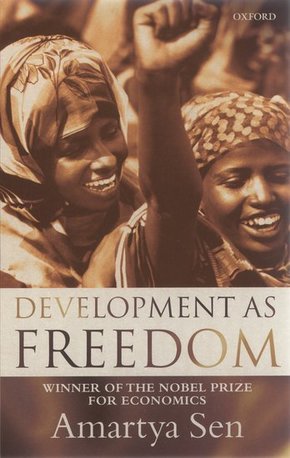
| Verlag | Oxford University Press |
| Auflage | 2001 |
| Seiten | 366 |
| Format | 12,8 x 19,6 x 2,2 cm |
| Print PDF | |
| Gewicht | 402 g |
| Artikeltyp | Englisches Buch |
| ISBN-10 | 0192893300 |
| EAN | 9780192893307 |
| Bestell-Nr | 19289330EA |
Amartya Sen is the most respected and well-known economist of his time. This book is a synthesis of his thought, viewing economic development as a means to extending freedoms rather than an end in itself. By widening his outlook to include poverty, tyranny, lack of opportunity, individual rights, and political structures, Professor Sen gives a stimulating and enlightening overview of the development process. His compassionate yet rigorous analysis will appeal to all those interested in the fate of the developing world, from general reader to specialist.
In Development as Freedom Amartya Sen explains how in a world of unprecedented increase in overall opulence millions of people living in the Third World are still unfree. Even if they are not technically slaves, they are denied elementary freedoms and remain imprisoned in one way or another by economic poverty, social deprivation, political tyranny or cultural authoritarianism. The main purpose of development is to spread freedom and its 'thousand charms' to the unfree citizens.
Freedom, Sen persuasively argues, is at once the ultimate goal of social and economic arrangements and the most efficient means of realizing general welfare. Social institutions like markets, political parties, legislatures, the judiciary, and the media contribute to development by enhancing individual freedom and are in turn sustained by social values. Values, institutions, development, and freedom are all closely interrelated, and Sen links them together in an elegant analytical framework. By ask ing 'What is the relation between our collective economic wealth and our individual ability to live as we would like?' and by incorporating individual freedom as a social commitment into his analysis Sen allows economics once again, as it did in the time of Adam Smith, to address the social basis of individual well-being and freedom.
Inhaltsverzeichnis:
Introduction: Development as Freedom
1: The Perspective of Freedom
2: The Ends and the Means of Development
3: Freedom and the Foundations of Justice
4: Poverty as Capability Deprivation
5: Markets, States, and Social Opportunity
6: The Importance of Democracy
7: Famines and Other Crises
8: Women's Agency and Social Change
9: Population, Food and Freedom
10: Culture and Human Rights
11: Social Choice and Individual Behaviour
12: Individual Freedom as a Social Commitment
